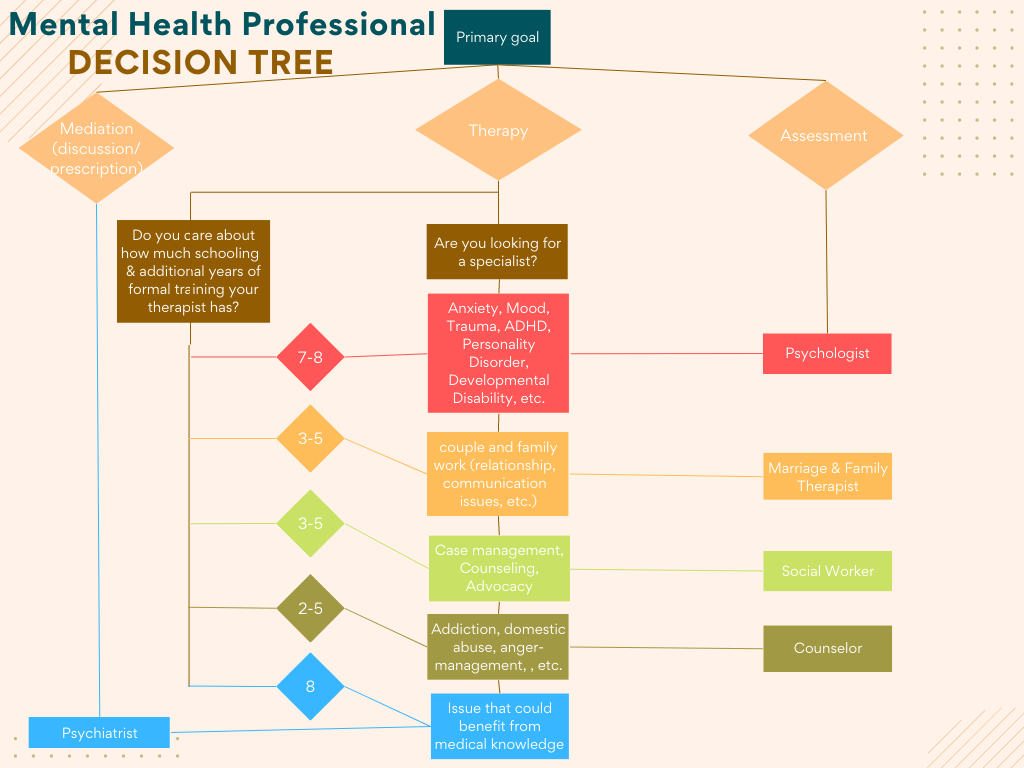It’s a huge relief to finally find the mental health professional who is your “right fit.” Not only will you be able to receive the help and support you need, but you may also find that your overall sense of well-being improves as you work through your unique issues with the guidance of a compassionate and understanding professional. Certainly, when beginning the process of finding the right mental health professional, it can be difficult to know where to start. However, it is well worth the effort.
Sometimes, the decision is simple. If your goal is solely to seek information or a psychiatric medication prescription, then a psychiatrist is likely the best fit. Additionally, if you seek assessment to determine your diagnoses or if you qualify for accommodations, then you likely need a psychologist. However, if you are looking for therapy, then you have numerous options.
Why does it matter which type of mental health professional I choose?
Mental health is an important aspect of overall well-being. Thus, seeking out the right type of mental health professional for your needs can make a significant difference in your journey towards healing and self-improvement. Finding the right fit is crucial. It can impact the effectiveness of treatment and how comfortable you feel opening up and discussing sensitive topics. Presently, in this blog we’ll explore factors to consider when choosing a mental health professional so that you can choose the right type of therapist to best match your needs.
Mental health professionals are trained professionals who provide support, treatment, and care to people experiencing mental health challenges. There are many different types of mental health professionals, each with their own specific training and areas of expertise. Understanding the role of each type of mental health professional can help you find the right support for your needs.
How to Find the Right Mental Health Professional
I hope this chart helps you decide which type of mental health professional best meets your needs. To make an informed decision, I broke this chart down into detailed information about each type of therapist who can help you accomplish your treatment goals for therapy, assessment, or medication.

Types of Mental Health Professionals:
-
Psychiatrists
A lot of patients call me and are unsure of whether they need a psychiatrist vs psychologist. Psychiatrists are medical doctors who specialize in the treatment of mental health conditions. They can prescribe medication, provide therapy, and order laboratory tests or other diagnostic procedures to help diagnose and treat mental health conditions.
- Training: They went to medical school, as opposed to graduate school for psychology/therapy. In California they are the only professionals on this list who can prescribe medication. Their training includes 4 years of medical school and another 4 years of residency in psychiatry.
-
Psychologists
Psychologists (like myself) are trained in the science of the mind and behavior. They can provide therapy to help individuals understand and cope with their thoughts, feelings, and behavior. They may do this by helping clients process their experience, identify patterns, and develop coping and problem-solving skills to better cope with or eradicate their symptoms.
- Therapeutic Approach: They may use a variety of therapeutic approaches to help people change negative patterns of thought and behavior. This can include a wide variety of psychodynamic, humanistic, or cognitive-behavioral therapy (CBT). This could include ACT, solution-focused therapy, relational, DBT, and so many other potential modalities. If you are looking for depth-oriented short or long-term psychotherapy with a specialist trained to work with your specific symptoms, a psychologist may be your best fit.
- Training: Psychologists’ training includes 4-6 years of post-undergraduate additional schooling and specialization that incorporate clinical work throughout. This is followed by 2-3 years of pre- and post-doctoral clinical training.
- Assessments: Psychologists are also trained to administer psychological assessments. This involves administering and interpreting tests to help understand an individual’s cognitive, emotional, and behavioral functioning. If you aim to learn whether you qualify for diagnoses (and associated work or school accommodations), psychologists can conduct a wide variety of assessments.
- For instance, do you think you might have ADHD? Do you feel you may qualify for many different diagnoses and aim to learn which actually apply to you? If so, then assessment can help you gain these answers as well as receive personalized recommendations about how to more effectively manage or eradicate your symptoms
-
Marriage and Family Therapists
Another common question I receive is about the differences between a psychologist vs MFT. Marriage and family therapists are trained to work with individuals, couples, and families to address relationship issues, communication, and problem-solving. They may work with people who are dealing with a wide range of issues. This may include mental health conditions, relationship problems, and parenting challenges.
- Training: MFT’s are typically the second most trained type of therapist (excluding psychiatrists) after psychologists on this list. Their training includes a two-year graduate program followed by approximately two years of working with clients pre-licensure.
- MFT vs Psychologist: Ultimately, the decision between a psychologist and an MFT will depend on your specific needs and preferences. If you are seeking support for a specific mental health condition, such as anxiety or depression, a psychologist may be a good choice. If you seek support for relationship issues or to improve communication and problem-solving skills within your family, an MFT may be a better fit.
-
Clinical Social Workers
Clinical social workers train to provide therapy, support, and advocacy to individuals, families, and groups. They may work with people who are dealing with a wide range of issues, including mental health conditions, relationship problems, and substance abuse. Social workers often work for organizations that provide community services, such as in government agencies or non-profit organizations.
- Training: Similar to MFT’s, social workers’ training includes a two year graduate program. MFT’s typically follow this with approximately two years of training in the field.
-
Counselors
Many people wonder about the difference between a counselor vs clinical social worker. Counselors can provide therapy and support to people facing a variety of challenges. This includes mental health conditions, relationship issues, and career problems. They may use a variety of therapeutic approaches, such as CBT or mindfulness-based therapy, to help people overcome their challenges.
- Training: MFT training tends to be more variable. Depending on their qualifications, it often includes a 1-3 year training course followed by clinical work pre-qualification.
So which Mental Health Professional is right for you?
In summary, each type of mental health professional has different training and qualifications. Therefore, it’s important to find the right fit for your needs. It’s important to choose a mental health professional with whom you feel comfortable and safe. Trust and rapport are key to the therapeutic relationship. Therefore, it’s important to find someone whom you feel comfortable talking to about personal issues. Most mental health professionals offer a free consultation call to discern goodness of fit. Remember, if a therapist feels you are looking for something beyond their scope of practice, they should discuss your options. They may refer you to the type of mental health professional that is most likely to best meet your needs. Keep in mind, may take some trial and error to find the right fit. However, the effort is worth it for the benefits of effective treatment.
Understanding the Letters Behind the Name (PhD, LMFT, etc)
Understanding the letters behind a therapist’s name can help you decipher which type of professional you are reading about when you see someone’s title:
Psychiatrists:
- Doctor of Medicine (MD)
- Doctor of Osteopathic Medicine (DO)
Psychologists:
- Doctor of Philosophy (PhD) in the field of psychology
- Doctor of Psychology (PsyD)
Counselors and Therapists:
- LMFT, Licensed Marriage and Family Therapist
- LPC, Licensed Professional Counselor
- LCADAC, Licensed Clinical Alcohol & Drug Abuse Counselor
Social Workers:
- LICSW, Licensed Independent Social Workers
- LCSW, Licensed Clinical Social Worker
- ACSW, Academy of Certified Social Worker
Finally, remember that it’s okay to take your time and be selective in your search for a mental health professional. Your mental health is just as important as your physical health. Finding the right person to work with can make all the difference in your journey towards healing and growth. So, when you’re ready to take the next step and begin therapy or seek assessment, fill this out to schedule a free consultation call. Begin your journey today: contact a therapist

